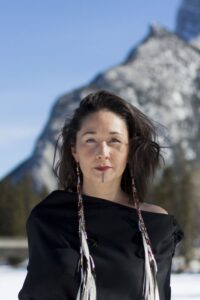Director Reneltta Arluk says what drew her to The Unplugging is how the play defies the norm of portraying different Indigenous perspectives in theatre. And it’s not Arluk’s first time taking on the play, which is based on the book Two Old Women; she previously directed it in Whitehorse.
“What I love about it is that it features older female actors, one being Indigenous and one non, and it allows them to share their world, their perspective, and their lived experience on stage,” says Arluk. “The play itself has a form of story to it, that it’s set in a cabin in the woods and these two women who are thriving in the time when we’d think they’d be the ones most at risk, so it kind of defies the norm in that way and it really shows the relationship of these two older women, and just the environment itself, being in the bush, which is really beautiful to see on stage with the set design and the lighting design.”

Arluk says that she was also very drawn toward playwright Yvette Nolan’s approach.
“What I love about Yvette’s writing is that it’s deceptively complex,” says Arluk. “So when you look at the words, you think, oh, this play is an easy read, but as you dig into the words more and more it really unfolds itself in a beautiful way. I actually really do enjoy directing Yvette’s work.”
The play is about two women who are forced to learn how to survive together in a post-apocalyptic world.
“They’ve been ostracized from their community that they were a part of—not a community they chose to be a part of, but one that they were kind of forced to be a part of,” she says. “They find themselves walking north into the woods, one person knowing where they are and one not, and then they end up having to survive in this one cabin. Then you really discover the strength of who these women are. Then a stranger comes to visit and disrupts the relationship.”
Arluk says that when it come to themes of the play, there’s a heavy focus on our personal connection with each other and with nature.
“It’s about knowledge sharing, generational knowledge, the apocalypse, what’s its like to have no technology, connection, environment,” says Arluk. “When we think about climate, we think about… the land and how we survive, how we reconnect to land.”
Arluk’s favourite part of directing is its collaborative nature.
“I like building a world with a collaborative team,” she says. “I like being able to envision a story and then have that story come to life with the designers, with the actors, with the space, and just kind of unfolding a world that the audience can come engage with. It’s rare that Indigenous women get to direct on stages in Canada, to be honest, so that’s also one thing.”
Arluk wants the audience to feel a sense of connection and community after seeing The Unplugging.
“Unity would be a big one,” she says. “And just to enjoy story. Enjoy listening to story again, enjoy engaging with characters on stage who really do reflect society in a very condensed way and through that navigation and desire to connect they do find a sense of hope through it all, and I think that that is actually what is necessary, what we need right now with each other.”
The Unplugging
Various times,
until Sunday, March 5
Various prices, The Belfry
belfry.bc.ca
